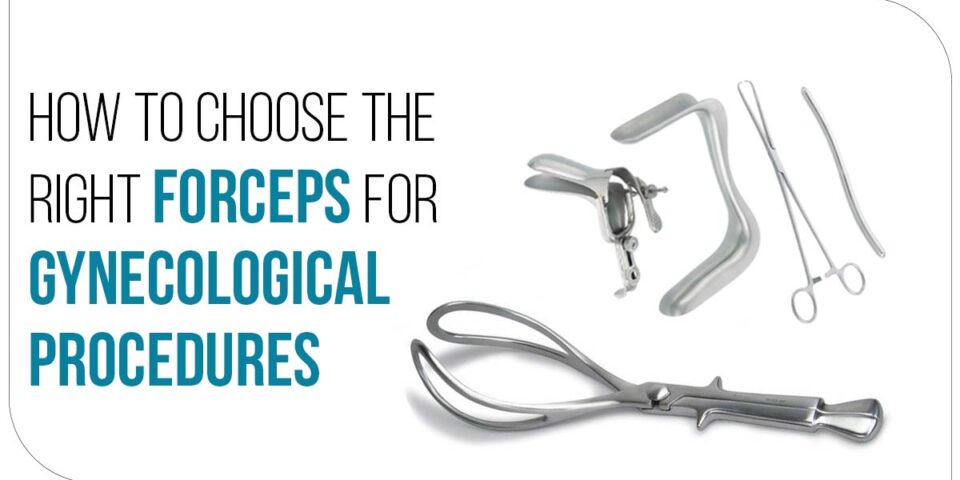Gynecological surgeries require precision, caution, and the right instruments to ensure patient safety and successful results. Forceps are one of the most common surgical instruments utilized during various procedures and are available in several types manufactured for specific functions. The right choice of forceps in gynecology plays a significant role in enhancing surgical efficiency while reducing the likelihood of complications. In this blog by R.L.Hansraj, the top surgical instruments manufacturers in Chennai, we will discuss major factors to decide on the right forceps for gynecological procedures.
1. Understand The Requirements Of The Procedure
The key toward the selection of the right forceps lies in understanding the type of gynecological procedure that is to be undertaken. Procedures in general may require a specific category of forceps depending on their nature of action, such as:
Dilation And Curettage:
In the procedure, Sims uterine scissors are normally used for cutting and trimming tissues.
Vaginal Delivery:
The Martin pelvimeter helps in measuring the size of the pelvis, ensuring that the delivery of the baby will be safe.
Iud Removal:
Saunder I.U.D. The removal hook is specially designed for the easy and safe extraction of intrauterine devices.
2. Consider The Design Of The Forceps
The design of forceps is crucial in their use in performing gynecological procedures. Some of the major features in the design, which one must look out for, include the following:
Tip Shape:
The tip of forceps can be straight, curved, or angled. The shape of the tip is related to the procedure and also to the area being worked on. In this regard, curved forceps could be more ideal for grasping tissues which are deep within the body.
Toothed Vs. Non-Toothed:
The toothed forceps from our surgical equipment dealers in Chennai, have a better grip of the tissues; hence, they are more applicable in holding and manipulating tissues during the operation. On the other hand, non toothed forceps are much more delicate and may be used on gentle structures to minimize trauma.
Length:
Length is another important critical factor. The short ones are used on superficial procedures, while longer ones can reach deeper during internal procedures.
The correct design provides more control and accuracy in surgery and minimizes the possibilities of trauma on tissue.
3. Material And Sterilization
Sterility of instruments is necessary for all gynecological procedures as it ensures that infection does not set in. Forceps come in a wide range of variations that are manufactured from different types of materials. These are:
Stainless Steel:
Most surgical forceps are manufactured from high-quality stainless steel, which is rigid and would not rust or corrode quickly. This kind of material is subjected to easy sterilization and multiple sterilization processes.
Single-Use Vs. Reusable:
Certain forceps are designed to be used once and are manufactured from medical-grade plastic. These kinds of forceps find application in outpatient procedures where sterilization may not be possible. Other reusable forceps can be sterilized and used multiple times and are, therefore, more affordable during frequent surgeries.
Sterilization needs are another significant factor in patient safety and infection control.
4. Comfort And Ergonomics For Surgeons
Surgical operations may take time, and comfort, as well as ease of handling, is required by the surgeon with his instruments. It is believed that forceps with ergonomic handles reduce hand fatigue and allow better control-especially during intricate or prolonged procedures. Look for forceps with smooth grips that conform to the hand, offering comfort without sacrificing performance.
5. Consider The Brand And Quality
Not all forceps are created equal, and, indeed, quality can make all the difference in the outcome of a procedure. Known brands that specialize in medical instruments more than likely produce durable and high-quality forceps. Other ways to assess the reliability of a particular brand or model include checking for certifications, warranties, and product reviews. 6. Cost Considerations
Admittedly, though high-quality forceps are important, the choice of instruments can be constrained by the budget. This would mean balancing the cost against quality. While cheaper alternatives might look somewhat attractive, durable and high-quality forceps will save costs in the long term since the frequency of replacement is reduced.
The most relevant forceps within gynecological surgery will be very carefully chosen, putting into consideration the procedure to be performed, design and material of construction, comfort, quality, and cost of the instrument. Each of these factors stands in its own merit in ensuring the successful outcome of the surgery and the safety of the patient. Through appropriate forcep selection, the surgeons are able to ensure better control and precision in gynecological surgery with the best results possible to the patient. As the best surgical instruments suppliers, we give you a wide range of options to meet the specific needs of surgeons.

